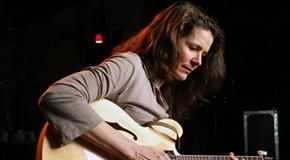Edie Brickell Releases Records Full Of Joy
The 44-year-old started both nearly a decade ago, but put the eponymous Edie Brickell on hold following the death of New Bohemians keyboardist and friend Carter Albrecht in 2007.
Over the same time, she worked with Steve Gadd and others on a separate project resulting in The Gaddabouts.
Brickell (who is also the wife of Paul Simon) spoke to The Associated Press about how she made a conscious decision to be happy, why she took Edie Brickell off the shelf and whether she’ll ever work again with New Bohemians, the band that scored a top 10 hit with “What I Am” in 1988.

AP: You’re releasing two CDs in January, the eponymous Edie Brickell and The Gaddabouts. Both have been in the works for a decade. What took so long?
Brickell: I took my time because living the family life, that’s such a huge job. So whenever a band would come into town, like the Gaddabouts, I would do that and in the meantime, write a lot of songs and just pick and choose from whatever batch felt right.
AP: How are the two projects similar and how are they different?
Brickell: I think that the solo record has a straight-ahead pop sensibility and I just wanted it to be a good time, a feel good time to have in the background. I recognized after “Volcano” that when I’m singing around the house, or listen to other music, I don’t listen to the sad music I make. I listen to happy music. I thought, man, I should be doing that. There was a real intention behind that record to make it feel good and move beyond melancholy a little bit.
AP: You dedicated Edie Brickell to Albrecht, who plays keyboards and sings on some of the tracks but was killed in 2007. How did he influence the record?
Brickell: He understood me and my personality and where I was going. You never had to tell Carter what to play. … You play a song for him and he got it immediately and took it up three notches. He took your idea and made it better.
AP: Despite the tragedy of his death, Edie Brickell is largely a joyous record, as is “The Gaddabouts.” Was that positive vibe by design?
Brickell: It’s just an evolution of spirit and consciousness, I think. In my late 20s, I thought, “Wow, things are fine for me. Why do I write sad songs? Why am I melancholy?” And I realized that I had emotional habits from my youth. … I think you get stuck in those emotional habits. If you don’t express a lot of joy early on, I don’t think you know how to later.
AP: You returned to recording with New Bohemians in 2006 and launched a short tour. How has your relationship with that band and the music you created more than 20 years ago changed over time?
Brickell: They’re like my brothers. I love to jam with them and improvise with them. … But as a musician I do want to grow and play with the people and express other things and not always be in the same group because it’s just tons of fun to experience music with other people. It’s magic. The more you can do it, the more you learn and the better you feel. But I always love and respect them.
AP: Do you anticipate working with them again?
Brickell: I do not right now because Carter was such a major player in that band and he brought us up to a level that made me feel more comfortable. I just don’t see it. It meant so much to stand there and look to my right and see him. That’s why I shelved this solo record for so many years. I couldn’t imagine standing up there and playing these songs without him. People, especially my son, heard the music and said, “Mom, why aren’t you putting this out?” And I thought, “I can finally listen to it now.” It just took me a long time.
 Daily Pulse
Subscribe
Daily Pulse
Subscribe

